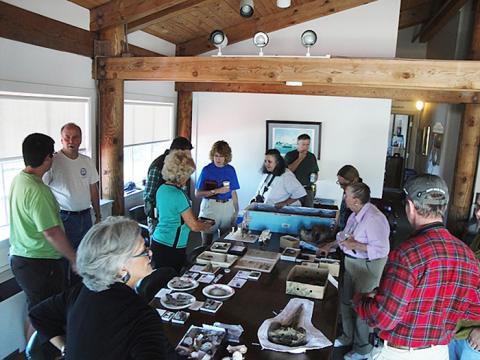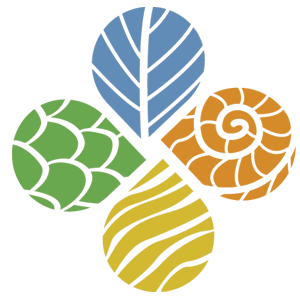
Amateur naturalists, such as the fossil club participants pictured here (Friends of the Calvert Marine Museum) are potential downstream users of iDigBio.
This past month (August 2013), I had the pleasure of giving a presentation to the Lee County Fossil Club on the value of collections as biodiversity data as well as for education and outreach (E&O) purposes. I was already familiar with this group of citizen scientists, having already presented my research on the paleontology of Panama and Colombia on a previous occasion. This club appreciates talks that mix Indiana-Jones-esque adventures with scientific discoveries however a talk about E&O was a new experience for me.
The primary theme of our discussion was making natural history collections (fossils in particular) more accessible and valuable to wider audiences, including those beyond researchers such as educators and students. A point of emphasis was that the fossil club members’ own personal collections also constitute important resources that could be utilized by both scientists as well as educators, if they were easily accessible. The club was introduced to iDigBio’s data portal which provides access to this country’s vast natural history museum collections that is in a constant state of growth with more data being added all the time. We also discussed one of the projects I coordinate, the Fossils of Panama project which is an initiative to digitize the Florida Museum of Natural History’s growing collections of fossils from Panama. With Fossils of Panama E&O resources are being created that are in part driven or designed by potential downstream users including teachers, students, and collectors.
We concluded by discussing the Fostering Opportunities for Synergistic STEM with Informal Learning (FOSSIL) project. The essence of this newly National Science Foundation funded project is the creation of a community of fossil club participants and professional paleontologists. The objectives of FOSSIL go beyond fostering a community, to include breaking down the physical and linguistic barriers between professional paleontologists and amateurs or hobbyists, assisting paleontologists in the digitization of museum and their own collections, and enhancing access to online collections throughout the U.S.
The Lee County Fossil Club represents a highly-engaged group who appreciates access to collections held in U.S. natural history museums and actively seeks out information about ancient biodiversity from online resources. As such, they are likely downstream users of the iDigBio data portal and able to provide feedback which will be pertinent to future development of digitally-driven E&O resources.




